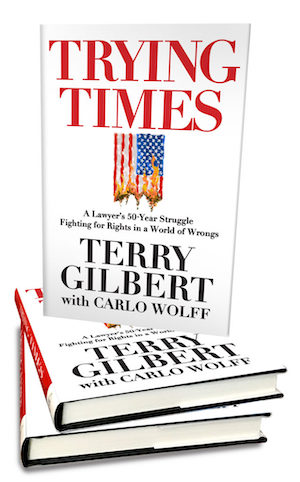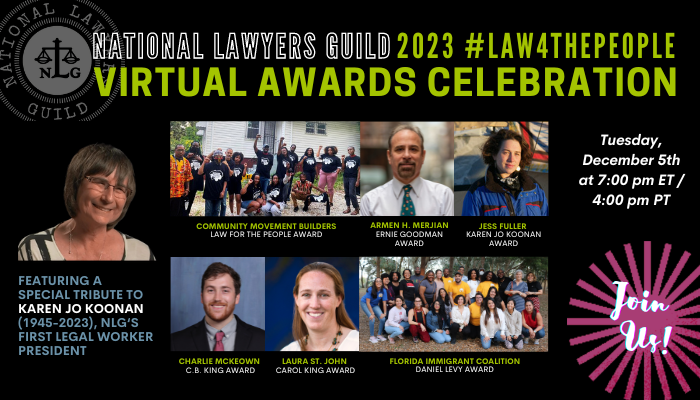Reviewed by David Gespass, NLG past president and member of NLG-Alabama
Your average lawyer’s memoir, if there is such a thing, talks about the triumphs – the trials that freed criminal defendants or won enormous damages for their wronged clients. Many speak of the nobility of our judicial system, the critical role of the rule of law in preserving democracy, and of the author’s lifelong love of the law. That is perhaps because your average lawyer memoirist has enjoyed a prosperous career and, consciously or otherwise, wants to justify the system that has allowed them to prosper.
Terry Gilbert’s legal career has also allowed him to prosper. He has had his share – maybe more than his share – of notable victories. His firm has expanded and thrived. In his twilight years, he has a number of young partners to whom he is passing the torch. The firm of Friedman & Gilbert (now Friedman, Gilbert & Gerhardstein) became a pillar of the Cleveland community and is now an Ohio-wide pillar. It survived the well-deserved retirement, after 40 years, of Gordon Friedman. It will endure and expand as Terry rides off into the sunset.
But Terry’s memoir, Trying Times: A Lawyer’s 50-Year Struggle Fighting for Rights in a World of Wrongs, expounds more on the cases he lost than the ones he won. He does devote some time to brief descriptions of multi-million dollar settlements of police misconduct cases, making sure to note that all the money in the world did not compensate the victims. It is a sad fact that, by and large, all the US legal system can do to compensate people for unspeakable losses is to give them money. Parenthetically, Terry and I worked on one case in Alabama together for the family of a man killed by a small-town police chief. We got some money, but I guess he decided it wasn’t enough to mention. Hurt as I was by the snub, I will forgive him that little peccadillo.
But, I digress. Really, the importance of Terry’s book and the critical lesson it teaches, is that when you litigate in US courts and you are fighting for true justice, you are in enemy territory. If US courts were just, Leonard Peltier would not have spent the last four decades in prison. If there were even a measure of justice, Sam Sheppard would have been exonerated and his son, scarred for life by the experience of having his mother murdered and his father accused and railroaded, would have received some compensation and, maybe more important, acknowledgment of the wrongs done to him as a seven-year-old. If there were justice, young people duped by government agents into violating the law would not consider an eight or ten-year prison sentence something of a victory. Yet these are the cases Terry spends his time describing.
There are other things in the book, too. Accounts of Terry’s youth of partying and travel and his finding true love. There is a lot I can relate to. We are both Jewish, though my upbringing was rather more secular than his. We both spent a fair amount of time getting high when we were younger, though he started in college and I in law school. The murder of four students at Kent State profoundly affected us both. And music was a big part of our lives, me as a fan, but Terry also as a player. There are some bands and musicians – the Meters and John Lee Hooker come to mind – whose sets start out kind of modestly and build throughout until, at the end, everyone is on their feet. Terry’s book has something of that trajectory, not that I was literally reading the last chapter on my feet, but the further into it I got, the more absorbing it was.
Terry and I are both long-time members of the National Lawyers Guild. When we joined, members in their 50s and 60s were the old generation and we were the young Turks. I now recall my 50th birthday as part of my youth. And we are now both more interested in succession than we are in building our own careers. As I recall, Terry and I first met in Rapid City, South Dakota during, or just after, the occupation of Wounded Knee. I was only there for three weeks, but Terry stuck it out, working on the post-occupation trials and, as noted, the railroading of Leonard Peltier.
But the point is that Guild lawyers recognize that the legal system is hostile to their clients and the causes they espouse, that litigation may be a component, but is not the motor of societal progress. That is a reason why it is important to talk about losses as much as, if not more than, wins. Even with litigation, it isn’t always winning that sparks change. Jules Lobel, who worked with Terry on a case they did win in the Supreme Court on behalf of people warehoused in Ohio’s supermax prison, having been sent there without rhyme, reason or due process, wrote a book called Success Without Victory. His point, which Terry emphasizes, is that waging the battle can be at least as important, in the long run, as winning the particular case. Terry recalls Martin Luther King, Jr.’s famous observation that the arc of history is long, but it bends toward justice. What is important to recall, however, is that the arc only bends towards justice when warriors for justice take it in their hands and bend it. Terry is one of those warriors. I am fortunate to call him my friend.
Learn more about Trying Times: A Lawyer’s 50-Year Struggle Fighting for Rights in a World of Wrongs here.
# # #




